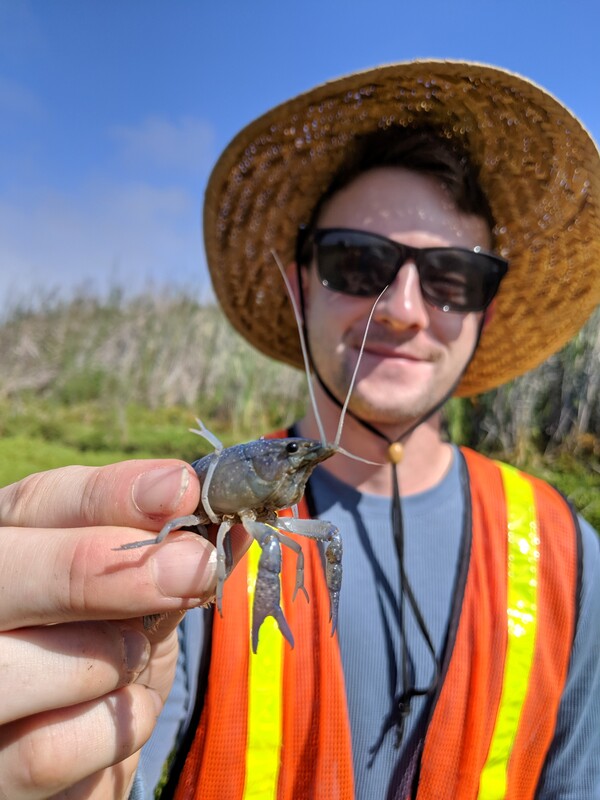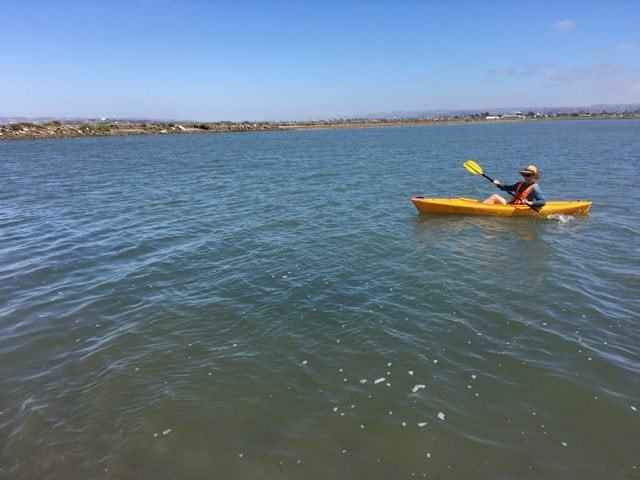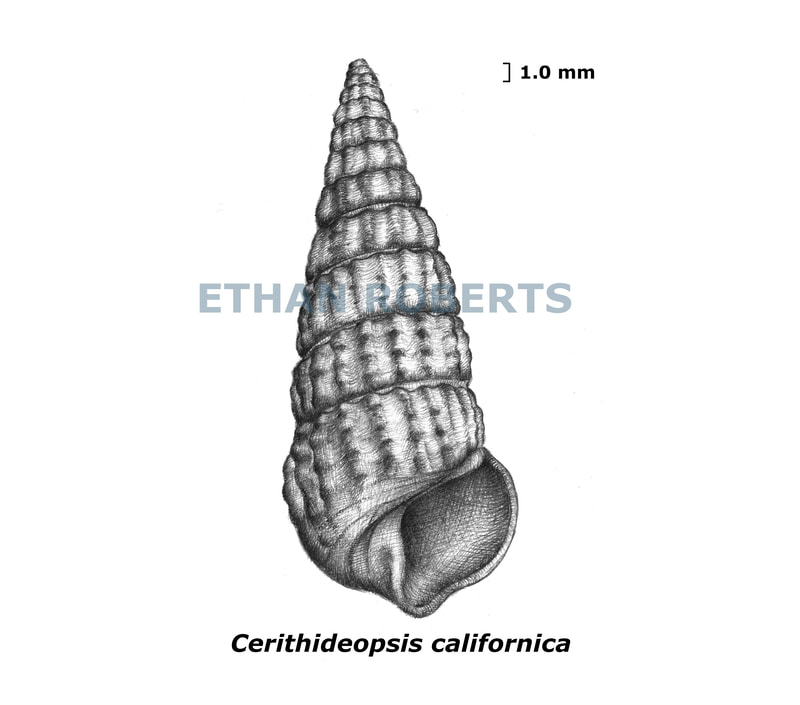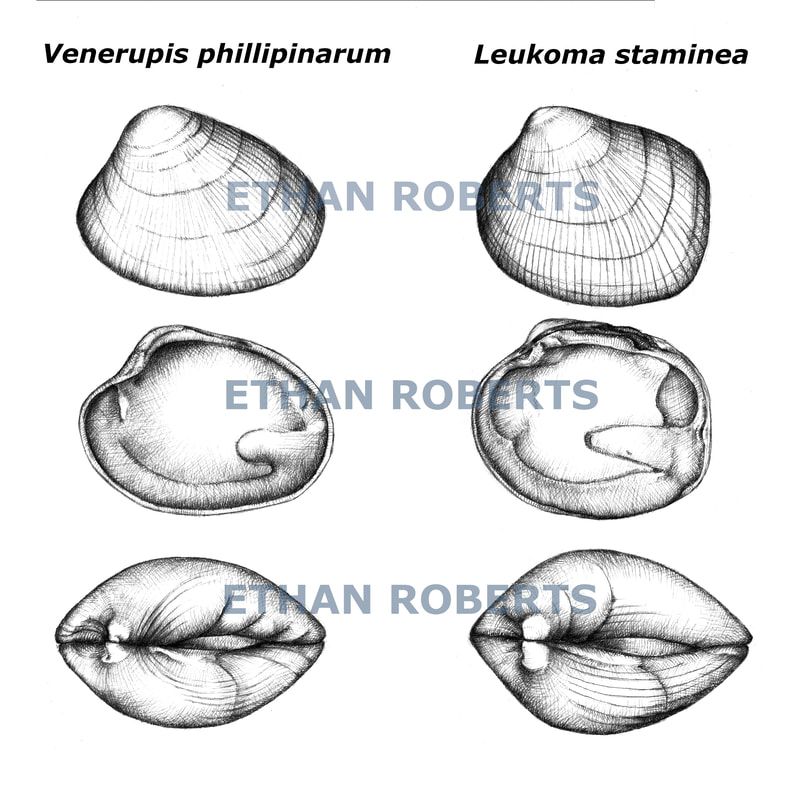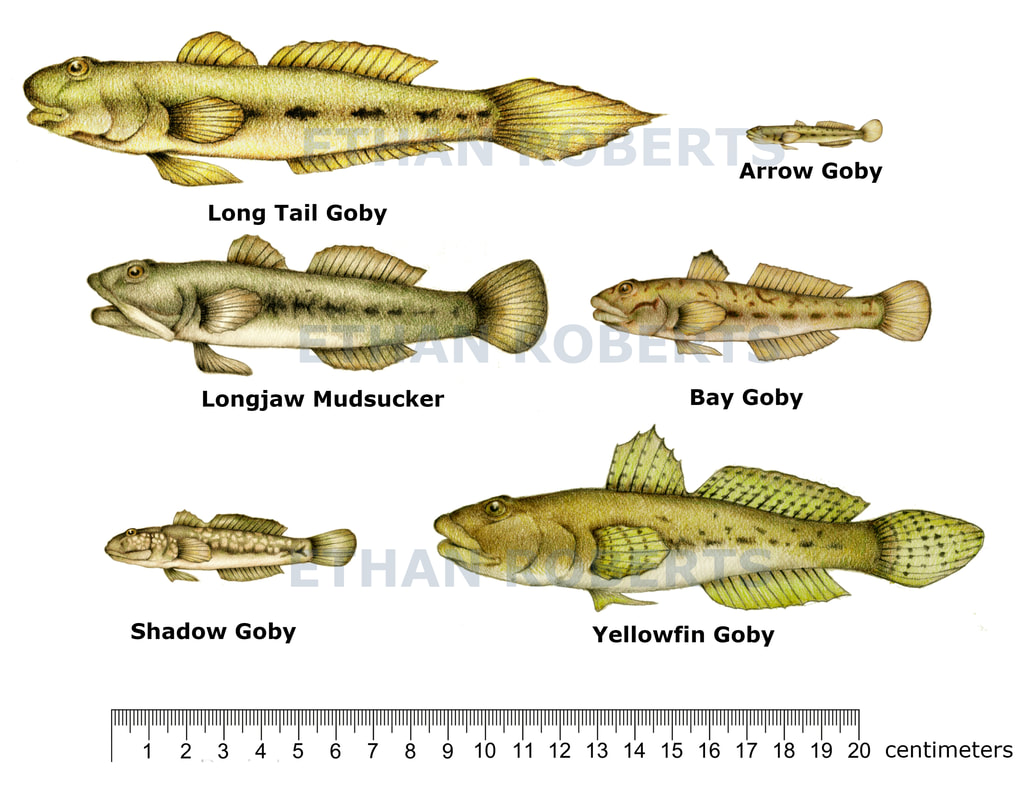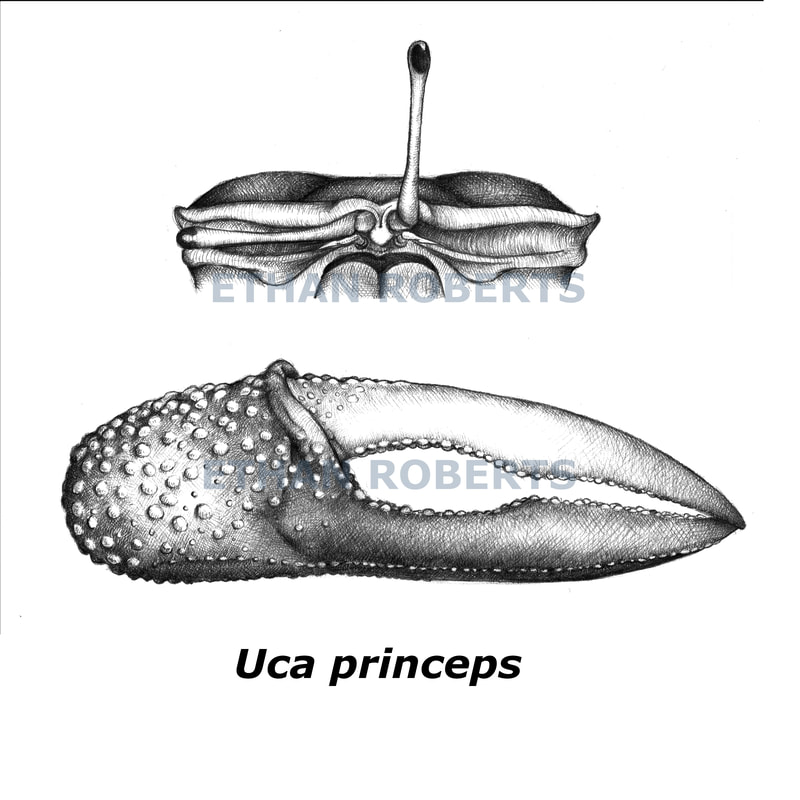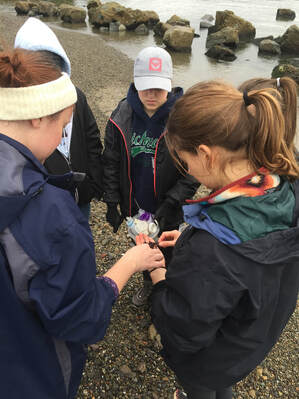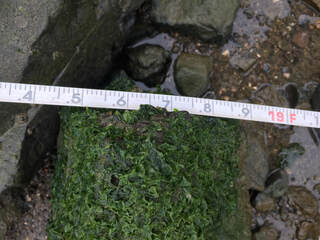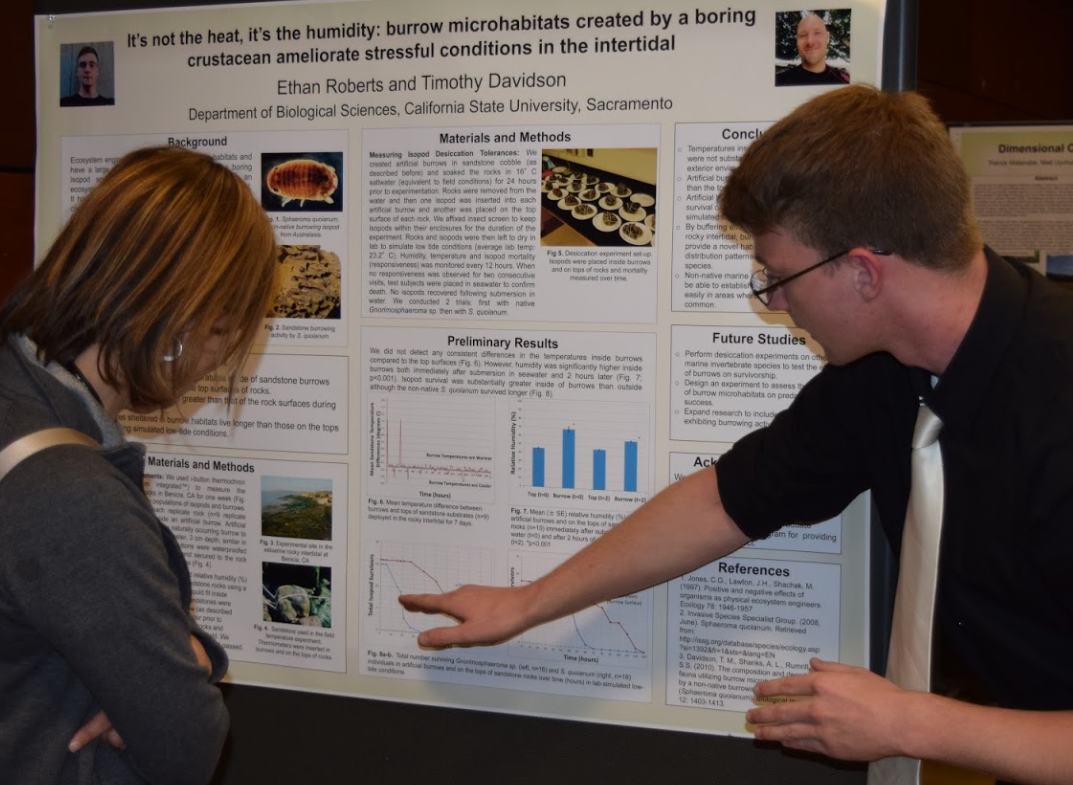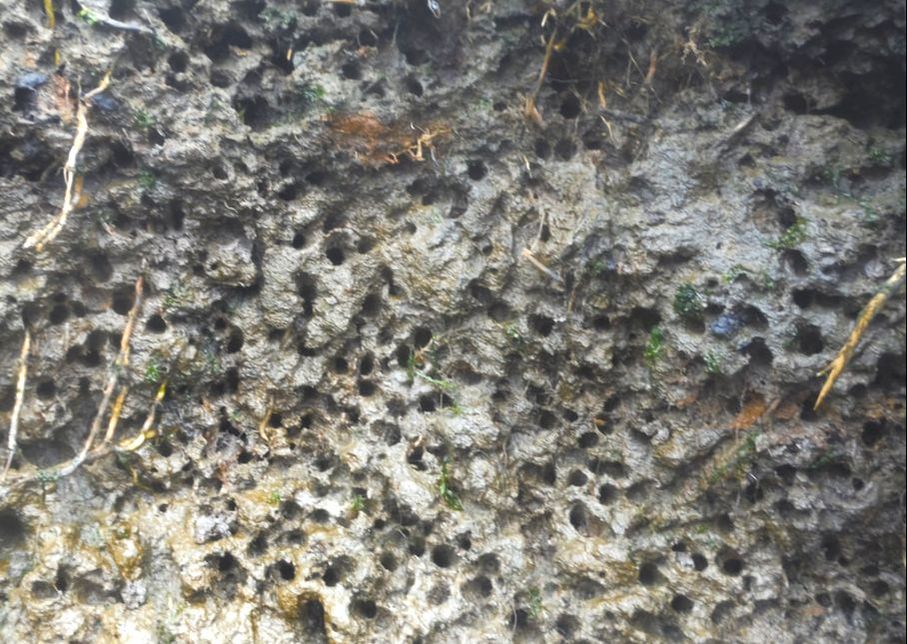|
This summer lab member Sarah Albright spent every other weekend searching for native and non-native algae throughout San Francisco Bay. As preliminary research for her Master’s thesis, Sarah is creating a list of algae species residing in the Bay, and their current range. Some algae were found everywhere (such as Mastocarpus and Ulva), while others were only found in a few locations (such as at Oakland Port, where she found Codium fragile and Sargassum muticum). 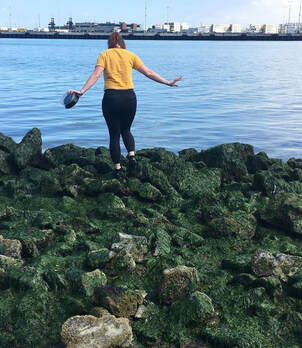 Fig 1. Sarah carefully stepping along rocks covered in slimy Ulva spp. across from Oakland Port in order to reach the water’s edge, where Sargassum muticum has established alongside other introduced species of algae. Sarah collected one specimen of each genus/species she could find during each trip and began to compile a small herbarium collection for future reference. These herbarium specimens will allow her to also take the time to more accurately ID individuals - though often, molecular analysis is required for identification to a species level. Nonetheless, these herbarium specimens can be used and archived should they become useful for another topic of interest at a later date. Outreach with Del Oro High School students: Additionally, Sarah spent some time with Del Oro High School students in the field. These high school juniors and seniors learned ecological field survey techniques, become familiar with intertidal marine ecosystems and organisms, and assisted in real data collection for a Master’s Thesis. Fig 2-4. Sarah training Del Oro High School students in the field identification of algae, how to create testable hypotheses from field observations, and field research concepts.
Guest contributor: Sarah Albright Ethan returns from a COAST internship at Tijuana River National Estuarine Research Reserve8/13/2019
This Summer, the Council of Oceanic Affairs, Science, and Technology (COAST) hosted undergraduate student internships at several of the 29 National Estuarine Research Reserves across the United States. Lab member Ethan Roberts spent his Summer interning with Jeff Crooks at the Tijuana River National Estuarine Research Reserve (TRNERR), where he helped analyze historical data and update species identification guides. The goal of his internship project was to make the job of identifying cryptic species easier by pointing out key features and making direct visual comparisons, so he took to creating illustrations with pencil and colored pencil. In one of his pieces, Ethan used image editing software to group his drawings of the most common local goby species onto a single page and scaled them to life-size. The print will later be used by the TRNERR team during the Fall research season. Ethan’s work is also novel in that it accounts for species not seen in San Diego previously. For example, some salt marsh habitats at TRNERR are now home to the Princely fiddler crab, Uca princeps, a large tropical visitor not found in any modern field guides (below). As global climate change continues, taking a second look over dated species guides and implementing visual tools may become important parts of doing good science.
Contributor: Ethan Roberts COAST offers internships and other research opportunities for undergraduate and graduate students at Sacramento State and beyond! See here for details. 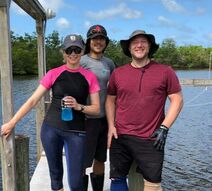 MS student Jessica Nichols and Davidson are preparing for a field trip to Rookery Bay, Florida to check on a field experiment. They are examining how wood-boring crustaceans and mollusks breakdown and alter structural complexity of wood debris in mangroves and the how such alterations may affect habitat use by other species. Last year, Nichols and Davidson (along with help from Dr. Andrew Altieri and CSUS student Anthony Ziba) deployed structurally complex wood habitat mimics (vulnerable to borers), identical habitat mimics made of fiberglass (impervious to borers), and control plots (no structure control). New MS student Sarah Albright took a group of high school students to survey for invasive marine algae in San Francisco Bay. Sarah is interested in the role of fragmentation in facilitating invasion by invasive algae. Finally, Ethan Roberts won 1st place at the Sacramento State Student Research & Creative Activity Spring Symposium. Ethan presented his updated results in his talk: "It's not the heat, it's the humidity: burrow
microhabitats created by a boring crustacean ameliorate stressful conditions in the intertidal." He received a small cash prize will be going on to to present his talk in a CSU-wide competition at CSU Fullerton later next month. Congrats to Ethan for his hard work! 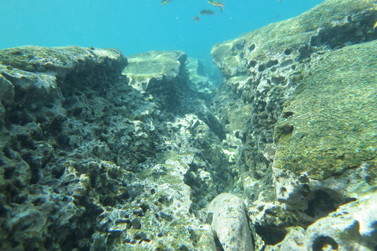 The newest paper from the Davidson lab has been published in Ecology Letters: Davidson TM, Altieri AH, Ruiz GM, Torchin ME. (2018) Bioerosion in a changing world: a conceptual framework. Ecology letters 21: 422–438 - Link This review and synthesis paper examines how the process of bioerosion, the breakdown of hard substrata by organisms, affects the structure and biodiversity in ecosystems and the socioeconomics of human systems. Then it predicts how this process is exacerbated or mitigated by human impacts. Many different organisms from bacteria to elephants bioerode substrata and this widespread process occurs all over the world from the deep ocean to the tallest mountains. For example, bioeroders, such as sea urchins, breakdown coral reef or rock to create pits to live in, erosive crabs and rodents create burrows in marsh banks and levees, while others such as lichens may dissolve and grow into stone used in monuments and statues. Thus, this process can have large scale (and sometimes destructive) impacts to ecosystems and human-made infrastructure (such as docks and buildings). Several human impacts, such as climate change, introductions of invasive species, and nutrient pollution are affecting bioerosion, which in turn can influence how these changes alter ecosystems and human infrastructure. However, these interactions are complex and interactive, and in many cases, we still do not have a strong understanding of how these human changes will influence bioerosion and future communities. Future work is needed to fully understand how bioerosion will be altered in an increasingly human-dominated world. 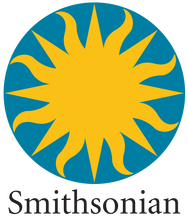 The Smithsonian offers graduate, post-doc, and senior researcher opportunities. See here for the current call for proposals. Undergraduate students & post-baccalaureates: check out this site for a list of internship opportunities (deadlines vary).
It has been a busy summer for the Davidson lab. My students, collaborators, and I have surveyed several estuaries on the Pacific coast (Coos Bay, Oregon, San Francisco Bay, and Panama canal zone, Panama) for wood boring invertebrates and are still working through the dozens of samples we obtained. Our preliminary data indicates that we may have even found a new invasive wood-borer in Coos Bay, Oregon, although we are still confirming those results.
A summer research student, Ethan Roberts, finished up an interesting study investigating how the burrows created by invasive boring isopods, Sphaeroma quoianum (image above), may provide a more buffered microhabitat for other species such as other isopods, amphipods, and snails. Through field and lab experiments, he found that burrow microhabitats are more humid and provide more desiccation resistance compared to exposed areas. These results suggest that these microhabitats may help marine animals better cope with desiccation stresses of living in the intertidal. During his studies, he also discovered dozens of individuals of New Zealand Mud Snails near Benicia in San Francisco Bay. It is unusual to find freshwater snails in such salty waters (10 ppt). Finally, I have established pilot experiments for a new study seeking to understand how ecosystem engineering by wood-borers may influence community composition and diversity in San Francisco Bay. I hope this experiment will help provide key data in support of a grant proposal. Esteemed marine ecologist, Tom Suchanek to present at Sacramento Darwin day on Sunday Feb 12 at 2pm1/31/2017
Day/time: Sunday, February 12; doors open at 2pm, event at 2:30 pm
Location: John Smith Hall, La Sierra Community Center, 5325 Engle Road, Carmichael Presenter: Thomas H. Suchanek Dr. Suchanek has over 100 peer-reviewed publications and professional reports and his research addresses critical questions in marine ecology, the impacts of environmental contaminants (such as mercury) in the aquatic environment, and the impacts of climate change. His talk is titled: The Reality Of Climate Change: A Path Forward http://sacdarwinday.org/ Cost: $5 for students, $10 in advance, $15 at the door. Multiple internships in California through COAST for summer 2017. Applications due March 6, 2017.
www2.calstate.edu/impact-of-the-csu/research/coast/funding/Pages/Summer-2017-Announcement-and-Application.aspx |
Proudly powered by Weebly



